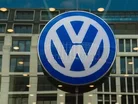How Volkswagen Plans to Achieve Wastewater Free Automotive Production

Volkswagen Group aims to make its production factories wastewater-free and has announced that it is close to achieving this goal at various sites.
The auto manufacturer hopes to reduce freshwater consumption across its brand portfolio by 25 percent by 2018. Analysis conducted by the company found that nearly all of its water consumption—95 percent—is directly attributed to the production process, most of it upstream in the supply chain and 10 percent in its own factories.
Through lifecycle assessment, the company computed the proportion of water recovered and reused across 45 sites in a footprint mapping exercise. The assessment indicated that combined, the sites used 3.8 million cubic meters of recycled water, corresponding to 8 percent of freshwater uptake.
Volkswagen’s goal is to operate a closed cycle, reusing water as often as possible. Its current treatment plants employ membrane and evaporator techniques that allow the bulk of process water to be reused. More than 95 percent of the water remains in the cycle or is used for cooling, garden irrigation or for flushing toilets.
Across its various production sites, Volkswagen has undertaken a number of initiatives to improve water efficiency. At its Wolfsburg plant in Germany, plastics painting is virtually free of process water and is achieved through a combination of technologies such as dehumidifying drying.
The Braunschweig plant has a conductance-controlled water spray metering system installed in its paint shop, saving 34,380 cubic meters of water and thereby reducing overall costs by £185,000.
VW’s Pune plant in India removes 99 percent of all biodegradable materials using biological wastewater treatment technologies that allow water to be reused onsite. This ensures that nearly all of the wastewater is returned back to the cycle. Additionally, the Pune plant uses special taps that reduce freshwater consumption by 75 percent.
The LEED Platinum certified Volkswagen plant in Chattanooga is reportedly the world’s most sustainable automotive manufacturing facility. There, rainwater collection provides 700,000 toilet flushes a year and cools wielding machines. Some six million gallons of water are reportedly saved in the paint shop through the use of a dry scrubber tool.
Water stewardship on a larger level is also being promoted throughout Mexico via the company’s ‘Think Blue. Nature.’ program, which includes a major reforestation and youth education project in the national park of Puebla.
490,000 mountain spruce trees have been planted in Puebla since 2008. The trees were planted in cooperation with 40 partners from the component supply industry in order to stabilize the region’s water table. Improved rainwater seepage has led to an additional water volume of up to four million cubic meters per year.
Volkswagen’s performance may be an anomaly. Earlier this year, an independent report on the auto manufacturing industry found that water consumption had actually increased across the sector.

